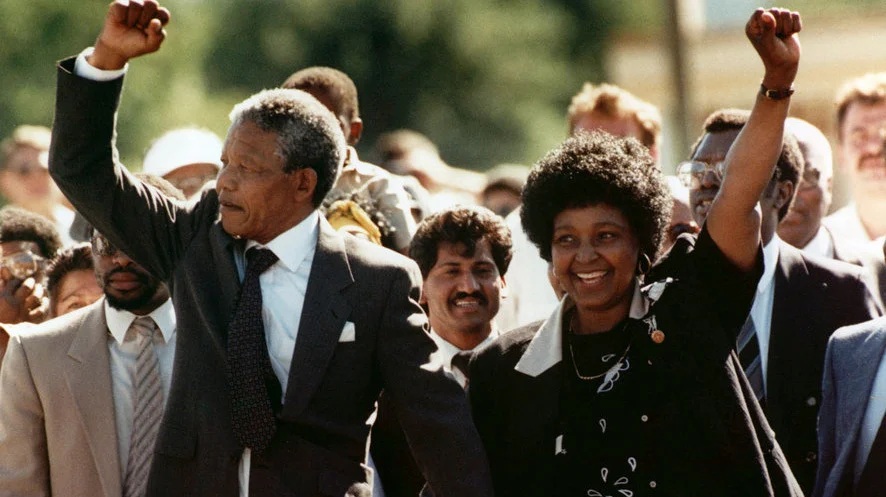
In post-apartheid South Africa, where the African National Congress (ANC) under the late former president Nelson Mandela sought reconciliation, democratic development, understanding, and emancipation of black South Africans in a peaceful way, a backsliding is now evident. As the saying goes, “all five fingers are not equal”; similarly, Nelson Mandela's successor(s) do not possess the same charisma to lead to successful reconciliation in post-apartheid South Africa.
By Ahsan Ali
The ANC has been in power since 1994, with Madiba (the clan name and a term of respect used for Mandela) being the figurehead till his death in 2013. The party has been embroiled in epidemic corruption, economic inequality, unemployment, and limited truth and reconciliation, which was the moral compass of Nelson Mandela.
The vision of Mandela is gradually shrinking with less internal accountability, either from the president or the recent police minister's interference in the KwaZulu-Natal judicial proceedings. ANC is falling more to the standards of a patronage and loyalty system rather than competent governance, institutional accountability, and improving the lives of locals.
A myriad of controversies took control of the nation, in which racism against white South Africans has been normalised by the government (and denied internationally). Current president Cyril Ramaphosa's attempts at renewal in the leadership have been stalled. The grievances led to the rise of actors such as Julius Malema within the state that directly anchors the controversial song against the South African white minority.
Malema was a member of the African National Congress Youth League since 2008, but was once an outspoken supporter of then-President Jacob Zuma, and later became his fiercest critic. He was suspended in 2012 for disciplinary violations against Zuma.
Malema is a master in outplaying the grievances of public opinion, and his frank politics are in a populist tone, distancing himself from Mandela's interracial reconciliation and reintegration completely. His party, “Economic Freedom Fighter (EFF)”, with African nationalism, anti-capitalism, left-wing populism and Marxist-Leninist leaning due to the white minority farm ownership.
He calls the liberation of the black majority from poverty, unemployment, and economic inequality, while calling on the government institutions of corruption, trust-deficit, lack of accountability and transparency.
The ANC government's poor decision-making, economic mismanagement, factionalism, and patronage system have made the once-hailed liberation movement into a political trust that is fading. The social divide between the black majority and the white minority remains stalled with residential segregation, low interracial marriages, and distrust influencing the daily politics and elections.
At the same time, corruption scandals are eroding trust and legitimacy further, with poor standards of implementation of the law by the law enforcement bodies. This erosion of social trust is a cause for concern, as it affects the fabric of South African society.
The long-overdue processing with fairness and accuracy under ANC has made farming a bone of contention, with Ramaphosa seizing land without compensation from white Afrikaners, which is more controversial. Malema's speeches on farmland reignited the racial tensions in South Africa, aiming to nationalise gold and platinum mines and seize land from white farmers.
Although the ANC's intention has been one of reconciliation, Malema's rhetoric seems to make society more divisive and erode the remaining interracial trust. Malema resonates with Zimbabwean former leader Robert Mugabe, who seized the land control of white farmland owners with violent displacement and no compensation.
The potential events can be supported under Max Weber's “political sociology” theory, where Weber emphasised the importance of institutional legitimacy and moral authority under charisma. Moreover, Weber warned of bureaucratic entanglements without checks and balances, where appointments were based upon loyalty rather than merit.
Mandela’s moral compass and ANC corruption scandals provide the contrasting reality of charismatic moral authority and legitimacy of Mandela and ANC, with corruption-plagued successors and ANC hollowed out in “state capture” under institutional weakness and ANC legitimacy.
Interesting in this regard is Robert Putnam's “Social Capital Theory”, where trust-building, social networking, and civic engagement are priorities to stabilise and have an effective democracy. The social cohesion is falling on the heels of racial divide, corruption scandals, and stalled integration, with eroding social trust and collective capital, with a widened gap between the state and citizens.
Though both theories signify that ANC is losing grip on power and challenging its rule, the challenging party must be pragmatic and resolve core issues rather than politicising basic living, such as the Economic Freedom Fighters (EFF). The need for practical solutions to South Africa's political problems is urgent and cannot be overstated.
In the aftermath of apartheid, the political parties of that era have re-saturated themselves, with one of them being the Democratic Alliance (DA). The DA has undergone significant changes in its leadership, policies, perception, and assimilation.
It aims to unite people of all races by promoting a vision of an 'Open, Opportunity Society for All' based on principles of freedom, fairness, and diversity. The DA highlights its success in building a diverse support base that transcends historical racial lines, particularly in urban areas, suggesting its ability to bridge racial divides.
Where the majority-black South African population is disillusioned with the ANC, the coloured leadership of the DA can change the reins of South Africa, which is internally going through a difficult phase. The coloured mix leadership will also withdraw criticism from the White House, and the DA may resolve core issues of the country and the farmland issue with much more pragmatism and diplomacy.
Whereas the ANC needs an overhaul of its structure from patronage and loyalty, as the ANC, on which individuals with personal interests have taken over, drives. This potential for change should give us hope for the future of South African politics.





